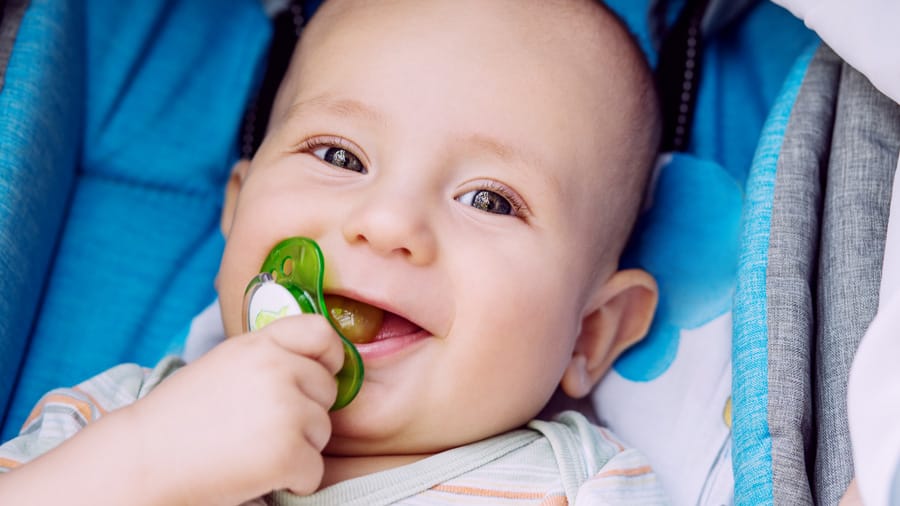Whether you call it a binky, a paci or something else entirely, a pacifier is probably one of the first things you reach for when your little one is fussy. As a concerned parent, you might stop and wonder from time to time if giving your baby a pacifier is the best thing for them. But according to the American Academy of Pediatrics (AAP), pacifier use is not harmful to infants. In fact, giving your baby a pacifier might help to lower their risk of sudden infant death syndrome (SIDS).
That said, there are numerous types of pacifiers on the market today, and choosing the best one for your child can be a tough decision. By understanding the differences between each type of pacifier and knowing what factors to look for, you can rest assured your little one will be safely soothed next time you give them a pacifier.
What Types of Pacifiers Are Available?
Pacifiers come in a variety of styles, materials and colors but can generally be divided into two main categories: orthodontic pacifiers and conventional pacifiers. The big difference between the two is the shape of the nipple.
You don't have to make a trip to an orthodontist to get your baby an orthodontic pacifier; the name simply means that the nipple has a flat bottom and a relatively square shape, which is designed to imitate the shape of the nipple on a mother's breast, according to the University of Rochester Medical Center. Orthodontic pacifiers also allow for a baby's "tongue thrust," which is the motion a child makes when sucking milk.
Meanwhile, conventional pacifiers have a rounded nipple shaped like a small ball.
Conventional vs. Orthodontic Pacifiers
While either pacifier option is acceptable to soothe your child, the type you pick might have an effect on their bite. A study published in the International Journal of Paediatric Dentistry found that the use of both conventional and orthodontic pacifiers contributed to an increased likelihood of malocclusion, or misaligned teeth.
If you're concerned about how a pacifier will affect your baby's oral health and bite, it's worth pointing out that orthodontic pacifiers may be less likely to contribute to bite issues in babies or toddlers. One study, published in Progress in Orthodontics, noted that orthodontic pacifiers were much less likely to contribute to open bites compared with conventional ones. The study in the International Journal of Paediatric Dentistry came to a similar conclusion, suggesting that conventional pacifiers were more frequently associated with open bite and overjet (sometimes known as buck teeth).
How to Choose the Best Pacifier for Your Baby
Your baby's pediatrician and your family dentist can provide guidance and advice when it comes to choosing the best pacifier, but here are a few things you may want to consider when choosing your little one's pacifier:
The pacifier's construction
Ideally, the pacifier will be all one piece, and it will not have any moving parts, a liquid interior or built-in gadgets, as the University of Rochester Medical Center notes.The size of the pacifier
Choose a size based on your baby's age. Also, pay attention to the size of the shield between the nipple and the ring. According to the AAP, to reduce choking risk, it should be at least 1.5 inches in diameter.The design of the pacifier
The AAP explains that you also want to avoid any pacifier that attaches to your baby's neck or hands or ties onto their crib, as these can endanger the child.
Remember that if you have questions or concerns about your baby's pacifier use or want further help choosing the best type of pacifier for your infant, your family doctor or dentist is there to answer your questions and provide advice and assistance.





